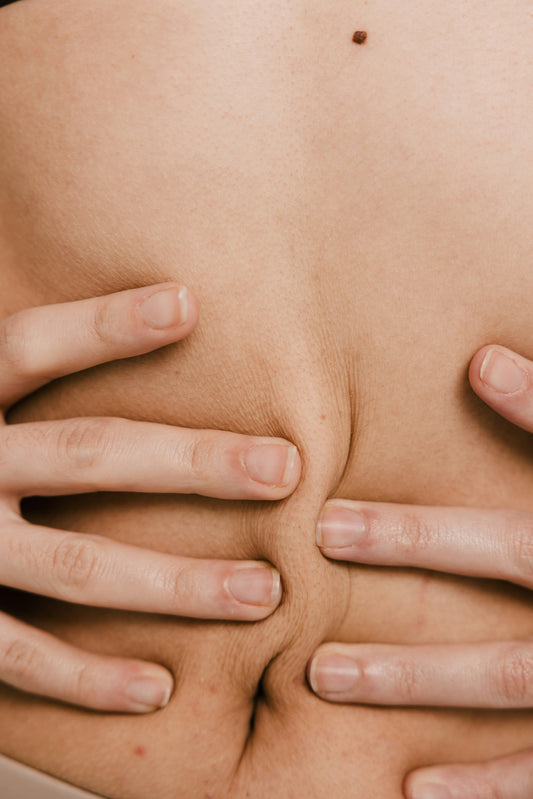
The Science Behind
Hormone Support is a carefully curated combination of vitamins, minerals, and probiotics is purpose-built to support and improve women's hormonal health. Our formulation is backed by a solid foundation of primary research and scholarly reviews, ensuring each element contributes to your well-being.

KEY BENEFITS
Balance Hormones • Ease PMS & Menstrual Discomfort • Boost Energy & Reduce Fatigue • Support Fertility & Hormonal Health • Enhance Mood & Emotional Well-being • Promote Clearer Skin • Aid Digestive & Gut Health • Support Relaxation & Better Sleep
Ingredients You Can Trust
-
Folic acid (Vitamin B9)
Folic acid (vitamin B9) is a form of folate which is essential for cell growth and development. It is especially important during early pregnancy and lowering the risk of neural tube defects. Since conditions like PCOS, reduced ovarian health, and infertility are often associated with lower folate levels, Hormone Support includes folic acid, which is more stable than folates typically found in foods. There is also a beneficial effect of folate on inflammation, oxidative stress, and blood sugar in women with PCOS.
Nutritional Supplements and Complementary Therapies in Polycystic Ovary Syndrome - 2022. PMID: 34970669
Homocysteine, vitamin B12, and folate circulating levels in women with and without polycystic ovary syndrome: A systematic review and meta-analysis - 2024. PMID: 39320480
Increased homocysteine levels in polycystic ovary syndrome - 2007. PMID: 17878022
Folate intake and ovarian reserve among women attending a fertility center - 2023. PMID: 34809974
Folic Acid Supplementation and Pregnancy: More Than Just Neural Tube Defect Prevention - 2011. PMID:22102928 -
Magnesium Glycinate
Magnesium supports over 300 processes in the body, including protein production, muscle and nerve function, and regulating blood sugar and blood pressure. It helps produce energy and supports bone growth, and antioxidant production. Magnesium levels have been shown to be lower in women with PCOS and PMS. Magnesium supplementation is effective in relieving PMS symptoms, such as bloating, cravings, cramping, anxiety, and sleep disturbances.
Evaluating the effect of magnesium and magnesium plus vitamin B6 supplement on the severity of premenstrual syndrome - 2010. PMID: 22069417
Pilot study of the efficacy and safety of a modified-release magnesium 250 mg tablet (Sincromag) for the treatment of premenstrual syndrome - 2007. PMID: 17177579
The Effects of Magnesium Supplementation on Subjective Anxiety and Stress-A Systematic Review - 2022. PMID: 35918728
Magnesium in the gynecological practice: a literature review - 2017. PMID: 28392498 -
Vitamin B3 (Niacin)
Niacin, known as vitamin B3, is needed by more than 400 enzymes for various bodily functions, including energy production from proteins, fats, and carbohydrates. It also helps with cell communication and can also support anti-inflammatory pathways and neuroprotection.
B Vitamins and Their Role in Immune Regulation and Cancer - 2020. PMID: 33158037
Dietary niacin and the risk of incident Alzheimer's disease and of cognitive decline -2004. PMID: 15258207 -
Vitamin B6
Vitamin B6 helps to break down proteins, sugars, and fats. It is important for brain health, the immune system, and red blood cell generation. While some oral contraceptives are reported to negatively impact vitamin B6 levels, vitamin B6 supplementation is demonstrated to improve premenstrual syndrome (PMS) for some women.
Oral contraceptive use: impact on folate, vitamin B₆, and vitamin B₁₂ status - 2011. PMID: 21967158
Effect of Combined Use of Calcium and Vitamin B6 on Premenstrual Syndrome Symptoms: a Randomized Clinical Trial. PMID: 26989667
A Pilot Randomized Treatment-Controlled Trial Comparing Vitamin B6 with Broad-Spectrum Micronutrients for Premenstrual Syndrome -2020. PMID: 31928364 -
Vitamin B12
Vitamin B12 is found mainly in animal-based foods, like fish, meat, poultry, eggs, and dairy. B12 is important for healthy reproduction as it helps improve the function of reproductive organs, reduce stress in the body, and lowers inflammation. A B12 deficiency may lead to anovulation, interfere with cell division, and create difficulty for embryo implantation.
Impact of vitamin B12 on the reproductive health of women with sickle cell disease: a narrative review - 2023. PMID: 37399204
Be well: A potential role for vitamin B in COVID-19 - 2021. PMID: 32829981
Vitamin B-12 and Perinatal Health - 2015- PMID: 26374177 -
Vitamin C
Unlike most animals, humans can't make vitamin C on their own, so we need to get it from our diet. Vitamin C acts as an antioxidant and plays an important role in maintaining the immune system. Vitamin C is also vital for making collagen, a protein in connective tissue that helps with healing, as well as iron absorption from plant-based foods (helpful tip for vegetarians!).
Serum Antioxidants Are Associated with Serum Reproductive Hormones and Ovulation among Healthy Women - 2015. PMID: 26581679
Effects of ascorbic acid supplementation on serum progesterone levels in patients with a luteal phase defect - 2003. PMID: 12909517
Effects of Low Vitamin C Intake on Fertility Parameters and Pregnancy Outcomes in Guinea Pigs - 2023. PMID: 37836389
Natural Molecules in the Management of Polycystic Ovary Syndrome (PCOS): An Analytical Review - 2021. PMID: 34063339 -
Vitamin D3
Vitamin D is naturally present in only a few foods. Vitamin D3 is produced from exposure to sunlight (UV-B radiation) and assists with calcium absorption for building strong bones. Research has also suggested that low vitamin D status is linked to fertility struggles, endometriosis, and polycystic ovary syndrome (PCOS).
Comparison of vitamin D2 and vitamin D3 supplementation in raising serum 25-hydroxyvitamin D status: a systematic review and meta-analysis - 2012. PMID: 22552031
Vitamin D supplementation in the treatment of polycystic ovary syndrome: A meta-analysis of randomized controlled trials - 2023. PMID: 36942243
Vitamin D - roles in women's reproductive health? - 2011. PMID: 22047005
The effects of vitamin D supplementation on metabolic profiles and gene expression of insulin and lipid metabolism in infertile polycystic ovary syndrome candidates for in vitro fertilization - 2018. PMID: 30286768 -
Zinc
Zinc is a mineral found naturally in some foods, and added to others. The body gets zinc from food, regulates how much it absorbs, and removes extra through digestion. Zinc plays a crucial role in the immune response as well as hormone regulation and the reproductive system. For women with PCOS, zinc can help improve insulin resistance and cholesterol levels. For those with period cramps, taking zinc before and during each cycle may help reduce period pain. Fun fact: zinc also is important for sense of smell and taste!
The Role of Zinc in Selected Female Reproductive System Disorders - 2020. PMID: 32824334
The Efficacy of Zinc Administration in the Treatment of Primary Dysmenorrhea -2016. PMID: 27168920 -
Bacteria
Hormone Support contains 20 billion CFU/g of clinically studied probiotic strains, including Bifidobacterium longum, Bifidobacterium lactis, Lactobacillus casei, Lactobacillus reuteri, Lacticaseibacillus rhamnosus, and Lactobacillus acidophilus. Research shows these probiotics play a crucial role in maintaining a healthy vaginal microbiome by supporting beneficial bacteria and preventing the growth of harmful ones. They help naturally lower vaginal pH, reducing the risk of infections such as yeast infections and bacterial vaginosis. These strains also promote digestive health, strengthen immunity, and contribute to overall reproductive well-being.
PMID: 34649216, 30525953, 29281632, 28277350, 36560972, 35562576 -
Inulin
Inulin is a type of fiber found in plants, especially in chicory roots, which are considered the richest source. Inulin acts as a prebiotic and is used to support gut health. It can also provide several other health benefits such as blood sugar control and inflammation reduction.
Inulin: properties and health benefits - 2023. PMID: 36876591
Inulin: Properties, health benefits and food applications - 2016. PMID: 27178951
Related blog posts
View all-

About Mela Hormone Support
Mela Hormone Support is created in collaboration with leading hormonal experts in medicine and science, ensuring the highest standards of quality and effectiveness. We carefully choose each ingredient for its...
About Mela Hormone Support
Mela Hormone Support is created in collaboration with leading hormonal experts in medicine and science, ensuring the highest standards of quality and effectiveness. We carefully choose each ingredient for its...
-

Meet the Probiotics in Mela Hormone Support
It's no surprise that many women trying Mela Hormone Support feel instant relief in their digestion. Packed with 20 billion bacteria from 6 different strains, these beneficial bacteria tackle not...
Meet the Probiotics in Mela Hormone Support
It's no surprise that many women trying Mela Hormone Support feel instant relief in their digestion. Packed with 20 billion bacteria from 6 different strains, these beneficial bacteria tackle not...
-

How Hormone Support can Help with PCOS
Polycystic ovary syndrome (PCOS) affects millions of women worldwide, manifesting in symptoms like irregular periods, acne, weight gain, and hormonal imbalances. Managing these symptoms often requires a holistic approach, including...
How Hormone Support can Help with PCOS
Polycystic ovary syndrome (PCOS) affects millions of women worldwide, manifesting in symptoms like irregular periods, acne, weight gain, and hormonal imbalances. Managing these symptoms often requires a holistic approach, including...




